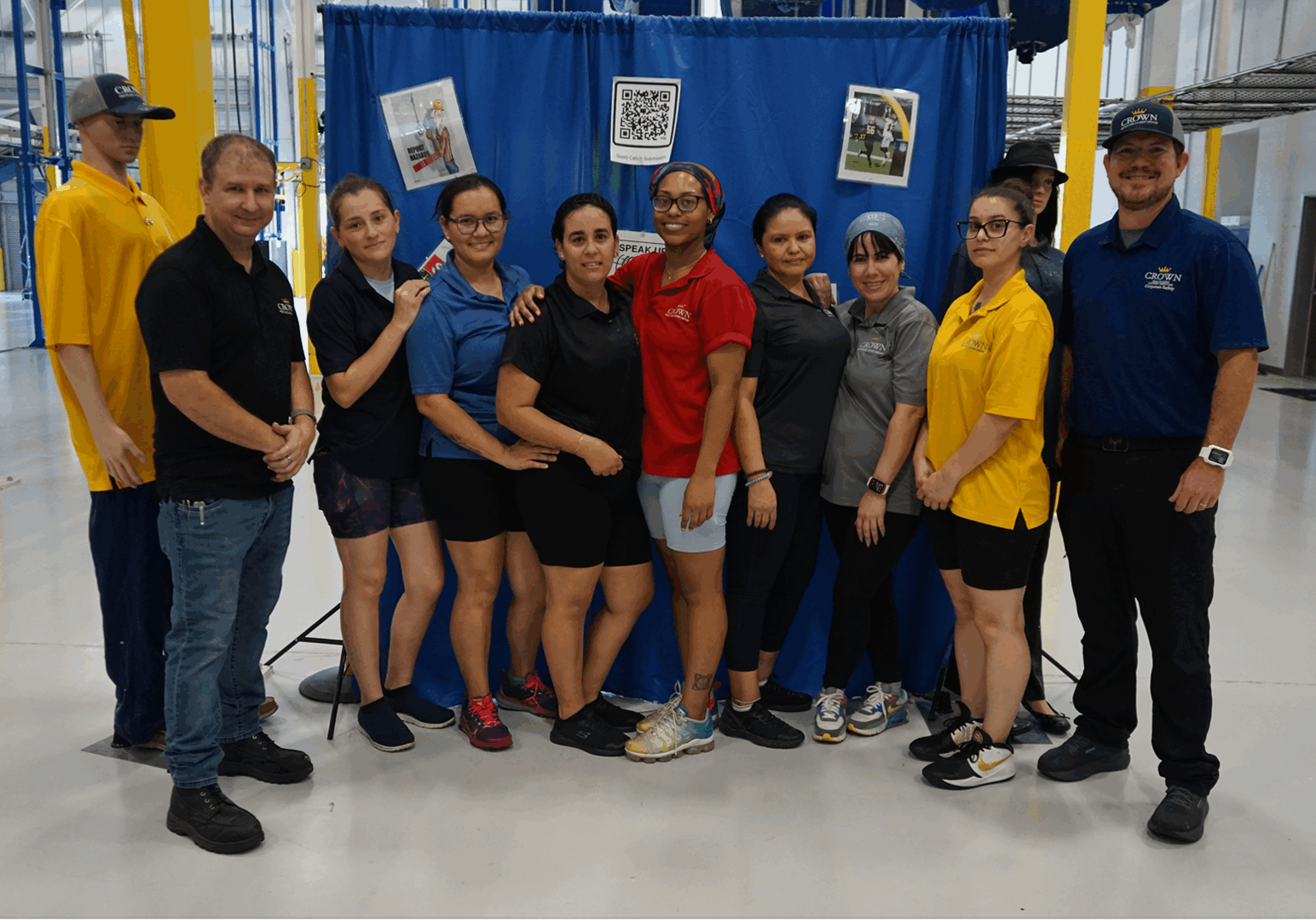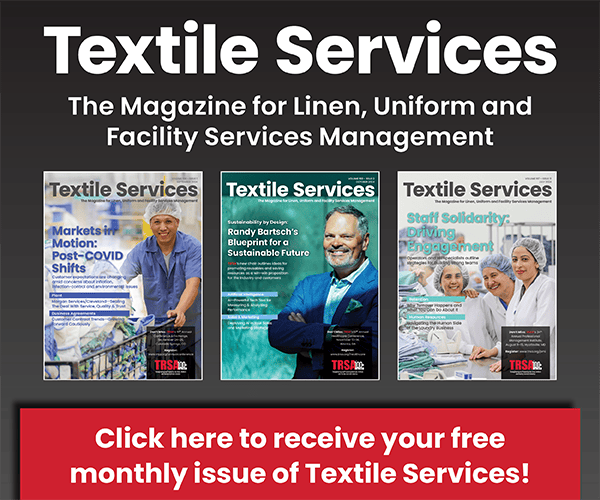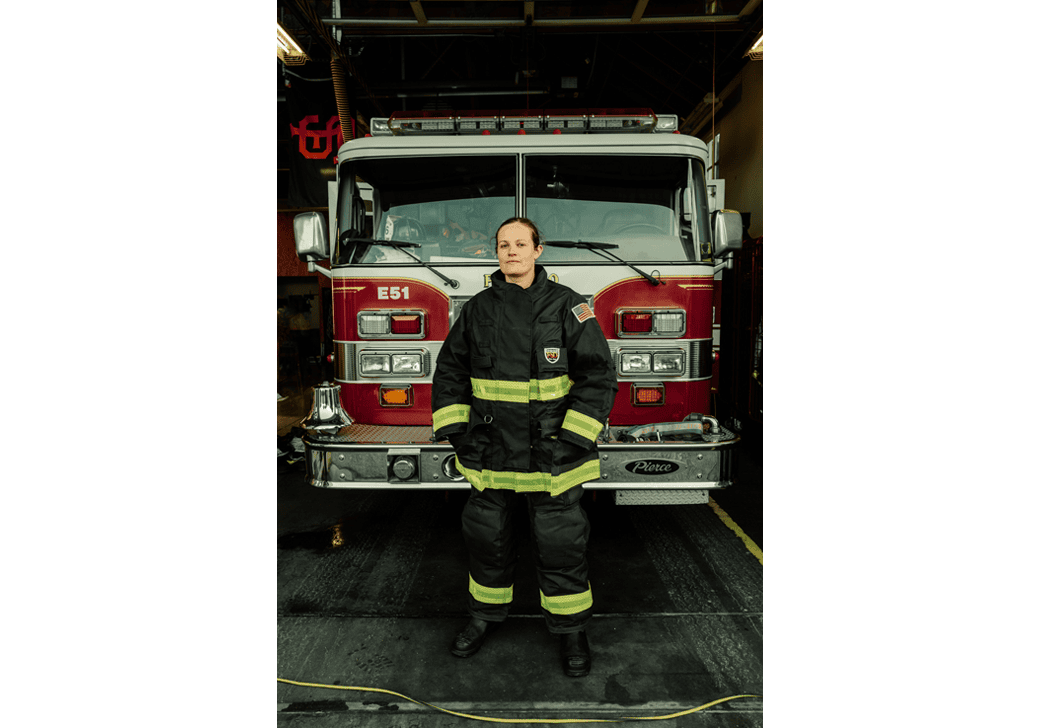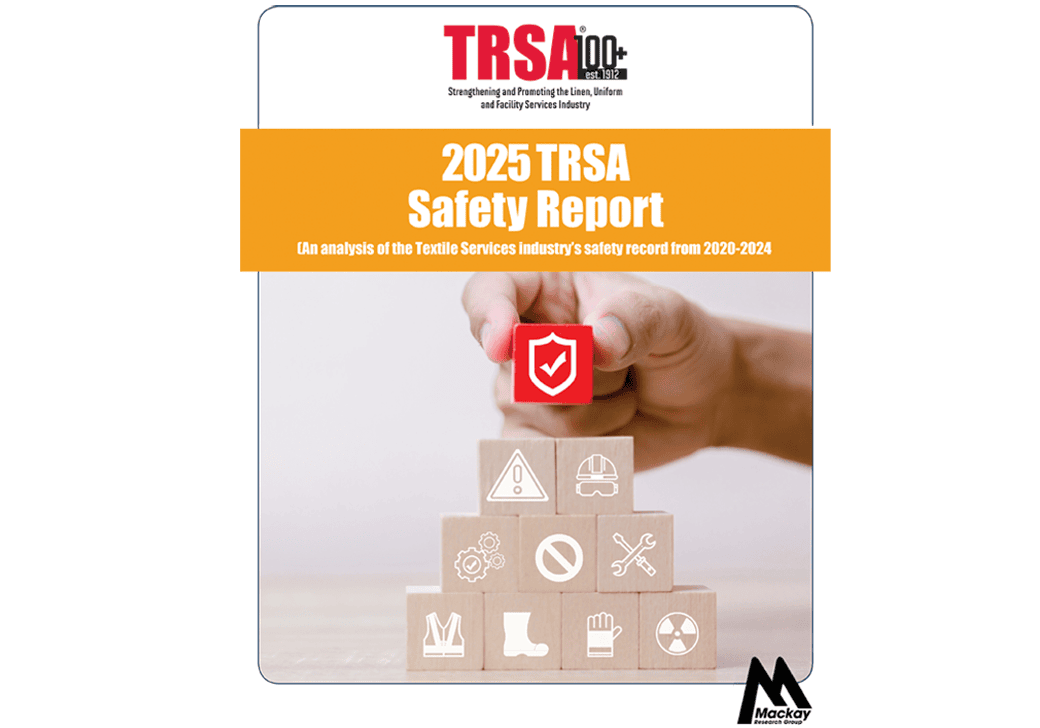It’s easier to build a safety culture when you’ve got every eye in the plant focused on identifying and reporting safety hazards.
That’s the aim of Crown Health Care Laundry Services’ “Good Catch” initiative. “It’s a really good program,” said Corporate Safety Manager Spence Roe. “The way it works is if you’re an employee, or anybody, and you see something that could potentially be a hazard, you take a picture of it with your phone.” Next the employee or manager who spots a potential risk waves his or her phone over a QR code posted in several areas of the plant. This leads them to an online form that they can fill out asking for details on what and where the hazard is. “What is it, where is it and how bad is it … there’s three simple questions,” Spence said of the program launched in April at the company’s Lakeland, FL, plant. “Once you answer those questions, you send a picture of it, and it comes straight to me,” said Spence, who works out of his home in Foley, AL, and Pensacola, FL, the corporate headquarters for Crown, which operates 10 healthcare plants across the Southeast U.S.
Spence says the program has helped lower the plant’s Total Reportable Incident Rate (TRIR) and the Days Away Restricted or Transferred (DART) Rate. Lakeland’s earned modification rate (EMR) for calculating workers’ compensation insurance rates is at near “1,” meaning that’s nearly at the industry average. That’s considered a positive number for insurance purposes. Roe added that the “Good Catch” program is generating enhanced self-awareness of safety at this busy facility. “One thing about this plant is it moves 1.3 million lbs. a week.” Roe said. “Wow. … They have 320 employees. That’s 640 eyes in the facility. So that is 640 eyes looking at safety issues.”
Incentives help drive participation, Roe said. When an employee or supervisor submits a form that cites a safety concern, they also classify it in terms of severity. While Roe and his team can accept or modify these assessments, that’s seldom an issue. “I get them, and I’ll leave it up to the employee to determine what the severity level is. The company provides gift card rewards for all qualified reports, based on three levels of severity: low, midlevel and severe. Spence describes the first category as “Your chances will be better to win the lottery for you to get hurt.” Midlevel hazards are the familiar “slips, trips and falls” or “struck by” risks, such as when you see water on the floor or someone is hit by a moving cart. Severe risks are those that could cause serious injuries that may require hospitalization.
In a major coup for the program, Spence described a recent incident in Crown’s Atlanta plant that was quickly neutralized thanks to an alert employee who saw what was happening and reported it. No matter how careful an operator and plant staff are, unexpected things can happen in a busy laundry environment. Spence describes how a sling was moving up on a hoist to a ceiling rail storage area. Somehow, a fire extinguisher hung on a nearby wall got entangled in the sling. When the sling moved up, the fire extinguisher went with it, hanging in mid-air. Once it was spotted, maintenance staff used a scissor lift to safely recover the fire extinguisher. Had it fallen it could have caused a serious injury, or at minimum, popped open and spread fire-suppression foam on nearby clean linen.
This “severe” category Good Catch earned the employee and his supervisor $50 gift cards. Roe said the company likes to reward employees as well as supervisors because Crown relies on the latter group to encourage participation in the program. “I’m able to give supervisors $50 gift cards as well because supervisors are your ‘floor generals.’”
Many plants also limit the use of cell phones by employees on the plant floor, he added. In those cases, employees report any issue they see to a supervisor, and he or she reports it online for Spence to review. Maintenance staff do not qualify for gift cards because ensuring safety is one of their primary responsibilities, Spence said.
All 10 Crown Health Care plants are participating in the program, Roe said. Members of each plant’s safety committee vote on the winners of $50 gift cards for the best “Good Catch” of the month in all three levels of severity. At the end of the year, Roe, COO Rick Hamlin and Corporate Engineer Lucas MCarty will select the “Good Catch” of the year for each plant. Winners in each level of severity will receive a $250 card.
Brian Varner, a safety consultant and adviser for the TRSA Safety Certification program, praised the Good Catch program as a great way to enhance safety awareness in a commercial laundry setting. “I recently visited Spence at Crown Laundry in Lakeland,” he said. “During our walk, he introduced me to a very effective safety-awareness program called ‘Good Catch.’ The technology, marketing and process behind this program is one of the best I have ever seen.”
While important, Good Catch is one of an array of initiatives that Crown is pursuing in its quest to systematically eliminate workplace hazards in its plants. Another tactic Crown recently adopted is placing bright-orange plastic buckets loaded with heat-stress aids around its plants. “We have buckets placed throughout the facility,” Roe said. If a manager sees that an employee is experiencing heat stress, he or she takes quick action. “All of the management team are trained to grab the bucket and take the employee to a cool location, sit them down, pop the top on the bucket,” he said. “It has a temporal scan thermometer, ice packs and Gatorades. It has linen.”
The bucket can double as a container for ice, he adds. “You can throw ice and water in it, and dip the linen in it, put it on the neck, armpits and wrist, to cool the employee down as quickly as possible.”
To underscore its commitment to safety, Crown recently certified its Lakeland plant to the TRSA Safety Certification standard. It’s among the first companies to achieve this distinction, along with the Hospital Co-Op Laundry facilities in Denver and Pueblo, CO. For more information on certification, contact TRSA’s Samlane Ketevong, senior director of certification and accreditation at sketevong@trsa.org.
Spence says Good Catch, the heat-stress kits, and the certification reflect a broad-based effort to reduce safety incidents. “We’re on to something here,” he said. “I just want to make sure we’re doing what we can so that employees are safe when they go home.”
Pictured above: (l/r) Jason Mosteller, general manager; Luz Hernandez, soil sorter; Diana Pena, shipping assistant supervisor; Yisbel Cabrero Carpio, production employee; Kathelene Rhodes, trainer; Luz Gonzalez, soil assistant supervisor; Jemnis Carpio, clinic assistant supervisor; Sheyla McCloud, production manager; and Spence Roe, corporate safety manager.
Sign Up For Our Newsletter
Receive the latest updates on the linen, uniform and facility services industry from TRSA delivered straight to your inbox.








